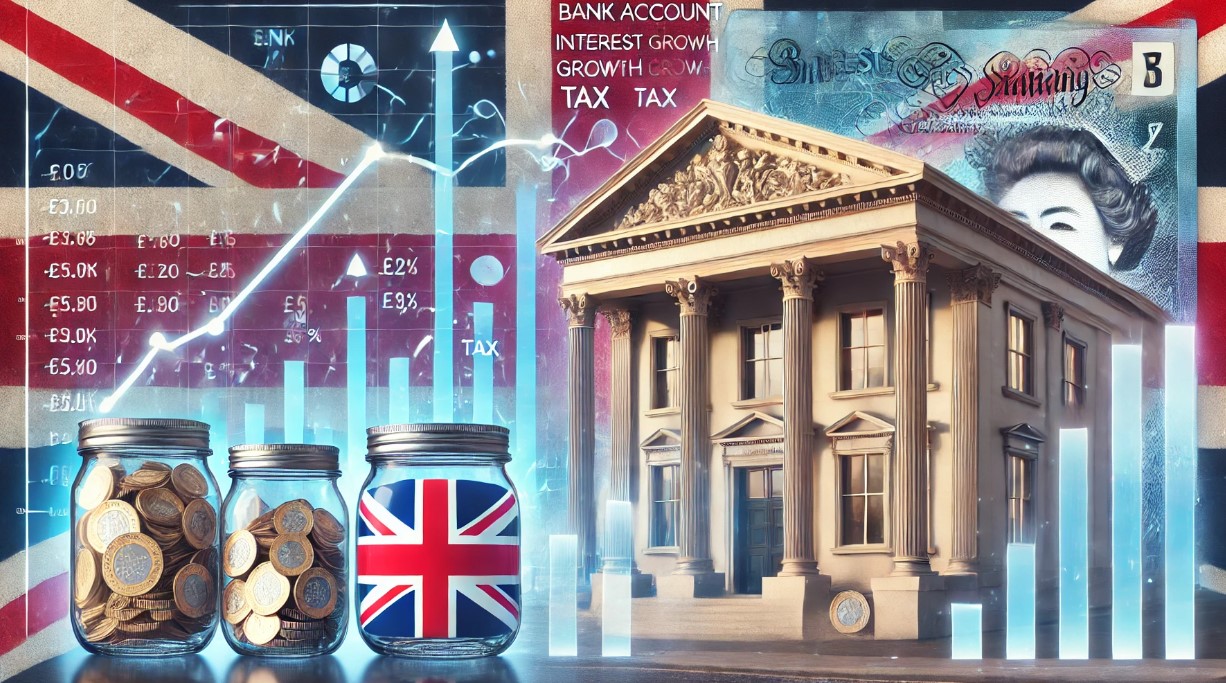Managing your finances wisely includes knowing how much interest you can earn from your savings before you need to pay tax. In the UK, several tax allowances help individuals save without paying tax on the interest earned.
These allowances include the Personal Savings Allowance (PSA), Personal Allowance, and the starting rate for savings, all of which can reduce or eliminate your tax liability on interest.
In this blog, we’ll explore these allowances, how they work, and how much interest you can earn without paying tax. Whether you’re a basic, higher, or additional rate taxpayer, understanding these thresholds will help you maximise your savings and avoid unnecessary tax bills.
What Is the Personal Savings Allowance?

The Personal Savings Allowance (PSA) was introduced by the UK government in 2016 as part of an effort to simplify savings taxation. The PSA allows most taxpayers to earn a certain amount of interest tax-free each year. The amount of tax-free interest you can earn depends on your income tax band:
- Basic rate taxpayers (20%): Can earn up to £1,000 in interest tax-free each tax year.
- Higher rate taxpayers (40%): Can earn up to £500 in interest tax-free.
- Additional rate taxpayers (45%): Unfortunately, there’s no PSA for additional rate taxpayers. They must pay tax on all interest earned.
The PSA applies to interest earned from various sources, including bank and building society accounts, peer-to-peer lending, and government or corporate bonds. However, tax-free savings accounts such as Individual Savings Accounts (ISAs) do not count towards your PSA, meaning all interest earned in ISAs is already tax-free, regardless of your PSA status.
How Is Interest on Savings Taxed in the UK?
Interest on savings is treated as part of your overall income and is taxed at your usual income tax rate if it exceeds the PSA or other allowances. Banks and building societies in the UK automatically report the interest earned on your savings to HMRC. HMRC then adjusts your tax code to reflect any tax you owe on interest over your PSA.
For example, if you earn £1,200 in savings interest as a basic rate taxpayer, £1,000 will be tax-free under your PSA, but the remaining £200 will be subject to tax at 20%. This means you’ll pay £40 in tax on that £200 of interest.
If you earn more interest than your PSA allows, the tax owed will either be automatically deducted through PAYE if you’re employed or through self-assessment if you’re self-employed.
What Are the Tax-Free Interest Limits for Basic, Higher, and Additional Rate Taxpayers?

The amount of tax-free interest you can earn depends on your income tax band. Below is a table that breaks down the PSA limits for different types of taxpayers:
| Taxpayer Type | Personal Savings Allowance | Tax-Free Interest Threshold |
| Basic Rate Taxpayer | £1,000 | Up to £1,000 in interest |
| Higher Rate Taxpayer | £500 | Up to £500 in interest |
| Additional Rate Taxpayer | £0 | No tax-free savings interest |
For example:
- If you’re a basic rate taxpayer and you earn £900 in interest from your savings over the tax year, you don’t have to pay any tax on it.
- If you’re a higher rate taxpayer and you earn £600 in interest, you’ll pay tax on the £100 that exceeds your £500 PSA.
- If you’re an additional rate taxpayer, all your interest is taxable, as the PSA does not apply.
How Can I Understand My Tax-Free Savings Threshold?
Understanding your tax-free savings threshold involves more than just the PSA. Your Personal Allowance and the starting rate for savings also play crucial roles in determining how much interest you can earn without paying tax.
- Personal Allowance: Every individual has a Personal Allowance, which lets you earn up to £12,570 per tax year before paying any tax. If you haven’t used up this allowance on wages, pensions, or other income, the unused portion can be applied to your savings interest.
- Starting Rate for Savings: This is an additional allowance that may apply if your income from wages or pensions is low. If your total income (excluding savings interest) is below £17,570, you may qualify for the starting rate for savings, which can allow you to earn up to £5,000 in interest tax-free.
The more you earn from wages or pensions, the smaller your starting rate for savings will be. For every £1 of income above £12,570, your starting rate for savings is reduced by £1. If your income exceeds £17,570, you do not qualify for the starting rate for savings.
Example:
You earn £16,000 in wages and receive £200 in interest from your savings account.
- Your Personal Allowance is £12,570, which is used to offset the first £12,570 of your wages.
- The remaining £3,430 of your wages reduces your starting rate for savings by £3,430, leaving you with a remaining savings rate allowance of £1,570 (£5,000 minus £3,430).
- Therefore, your £200 in savings interest falls within the starting rate for savings, and you will not pay tax on it.
When Do I Need to Pay Tax on Savings in the UK?
You need to pay tax on savings interest only if it exceeds your available allowances (Personal Allowance, starting rate for savings, and PSA). The rate at which you pay tax depends on your tax band:
- Basic rate taxpayers: Pay 20% on interest over £1,000.
- Higher rate taxpayers: Pay 40% on interest over £500.
- Additional rate taxpayers: Pay 45% on all interest earned, as they do not benefit from a PSA.
If your savings interest is taxed, HMRC will usually collect this tax by adjusting your PAYE tax code if you’re employed or retired. Alternatively, you may need to report your savings interest via self-assessment if you earn substantial interest.
Does Having More Money in My Bank Account Affect Tax?

The size of your bank balance alone does not trigger tax. However, the interest you earn on that balance is what matters. For instance, if you have £100,000 sitting in a savings account but it generates no interest, there is no tax to pay.
On the other hand, if that £100,000 earns £1,500 in interest, the first £1,000 may be tax-free (if you’re a basic rate taxpayer), while the remaining £500 would be taxable.
Banks and financial institutions automatically report any interest paid to HMRC, so it’s crucial to keep track of how much interest you’re earning, especially if you hold large balances.
How Can I Maximise My Tax-Free Savings?
There are several ways to maximise your tax-free savings in the UK:
- Use ISAs (Individual Savings Accounts): ISAs allow you to save or invest up to £20,000 each year without paying tax on the interest or gains. ISA interest doesn’t count toward your PSA, so it’s a great way to maximise tax-free savings.
- Take advantage of the starting rate for savings: If your income is low (under £17,570), you may be able to earn up to £5,000 in interest tax-free under the starting rate for savings.
- Split savings with a spouse: If you’re married or in a civil partnership, you can split your savings across both partners’ accounts to double your PSA. For example, two basic rate taxpayers could each earn £1,000 of tax-free interest.
- Utilise tax-efficient investments: Products like Premium Bonds, some NS&I accounts, and certain insurance products provide tax-free interest or winnings, which can further reduce your tax liability on savings.
How Do I Avoid Paying Tax on My Savings?
There are several legal ways to avoid paying tax on savings interest in the UK:
- Maximise your use of ISAs: As mentioned earlier, ISAs allow you to earn interest without paying tax, making them one of the best tools for tax-efficient saving.
- Utilise your starting rate for savings: If your other income is below £17,570, you can earn up to £5,000 in interest tax-free.
- Use your Personal Allowance: If you haven’t used up your Personal Allowance on wages or pension income, you can apply it to any interest earned.
- Gift savings to a spouse: You can gift savings to your spouse, allowing both of you to make full use of your PSAs. This can be especially helpful if one partner is a lower taxpayer.
Do Banks Notify HMRC of Large Deposits?

Yes, banks report the interest earned on your savings to HMRC if it exceeds your PSA or other thresholds. Large deposits themselves are not directly taxed, but they may trigger anti-money laundering checks, particularly if the amounts exceed £10,000.
While large deposits may raise questions with your bank, simply having a large sum of money in your account is not illegal and doesn’t automatically attract tax unless it earns interest.
How Much Cash Can I Keep at Home in the UK?
There’s no legal limit on how much cash you can keep at home in the UK. However, keeping large sums of cash at home carries significant risks, such as theft, loss, or damage from fire or other disasters.
Additionally, money kept at home does not earn interest, so you are effectively losing potential value over time due to inflation. It is generally safer and more beneficial to keep money in a secure bank account or other tax-efficient financial products, such as ISAs, where it can grow over time without being taxed.
What Happens If I Don’t Declare Taxable Savings Interest?
Failing to declare taxable savings interest can have serious consequences. If the interest you earn exceeds your Personal Savings Allowance (PSA) or other applicable allowances (such as the starting rate for savings), you are legally obligated to pay tax on it. Most banks automatically report your savings interest to HMRC, and HMRC may adjust your tax code to collect any tax owed.
However, if you’re required to report savings interest through self-assessment (for example, if you earn significant interest, are self-employed, or have other untaxed income), you must declare it accurately. Failing to report taxable interest can result in penalties, backdated tax payments, and interest on any unpaid tax.
In some cases, HMRC might be lenient if an honest mistake has been made, especially if the underpayment is minor and quickly corrected. However, deliberate tax evasion or failure to report substantial interest can lead to heavier penalties or legal action.
If your taxable savings interest is below the PSA or other relevant allowances and tax was mistakenly deducted, you can reclaim the overpaid tax. You can do this through self-assessment or by completing an HMRC form (R40). Claims for overpaid tax must be made within four years from the end of the tax year in which the interest was earned.
How Do Savings and Interest Affect My Overall Tax Liability?

The interest you earn from savings counts as part of your overall income for the tax year. This means that any interest earned could potentially push you into a higher tax band, increasing your tax rate on savings and other income. For instance, if your savings interest takes your total income over the basic rate threshold, you may end up paying 40% tax on the excess, rather than 20%.
Savings interest can also affect other financial allowances and benefits. For example, earning higher savings interest could reduce your eligibility for Child Benefit if your total income exceeds £50,000. Similarly, it could affect Marriage Allowance eligibility, as your partner must earn less than £12,570 to transfer some of their unused Personal Allowance to you.
It’s important to consider how your savings and interest fit into your overall financial picture, as they could have a ripple effect on other aspects of your tax liability and benefits.
Conclusion
In the UK, the amount of savings interest you can earn without paying tax depends on several factors, including your Personal Savings Allowance (PSA), Personal Allowance, and starting rate for savings. Understanding these allowances and how they apply to your individual circumstances can help you minimise your tax liability and maximise your tax-free savings.
For basic and higher rate taxpayers, the PSA offers a straightforward way to earn up to £1,000 or £500 of tax-free interest, respectively. However, for those with lower overall income, the starting rate for savings can be particularly beneficial, allowing up to £5,000 of tax-free interest, in addition to the PSA.
By taking full advantage of ISAs, the starting rate for savings, and your Personal Allowance, you can ensure that your savings work for you in the most tax-efficient way possible. Whether you are earning interest from a bank account, building society, or investments, staying informed about your tax obligations will help you make the most of your money and avoid any unexpected tax bills.
FAQs
How does HMRC know how much interest I’ve earned?
HMRC is automatically notified by your bank or building society about the interest you’ve earned. Based on this information, HMRC may adjust your tax code if you need to pay tax on interest that exceeds your Personal Savings Allowance (PSA).
What happens if I exceed my Personal Savings Allowance?
If you exceed your PSA, you will need to pay tax on the interest that goes over the allowance. This tax is generally collected through adjustments to your PAYE tax code, or you may need to declare the interest via self-assessment.
Are joint accounts subject to PSA limits?
Yes, interest from joint accounts is split equally between account holders for tax purposes. Each person can apply their own PSA to their share of the interest. For example, a couple with a joint account could potentially earn up to £2,000 in tax-free interest if both are basic rate taxpayers.
Does the Personal Savings Allowance apply to interest from ISAs?
No, ISAs (Individual Savings Accounts) are completely tax-free, meaning that any interest earned in an ISA does not count towards your PSA. ISAs offer a separate and additional way to earn tax-free interest.
Can I split my savings between accounts to avoid paying tax?
While you cannot avoid tax simply by spreading your savings across multiple accounts, you can split your savings with a spouse or partner to maximise the PSA available to both of you. Each individual is entitled to their own PSA, so this can help increase your tax-free savings.
Is interest on foreign accounts subject to UK tax rules?
Yes, any interest earned on foreign bank accounts must be declared to HMRC and is subject to UK tax rules. The same allowances, such as the PSA, apply to foreign interest, but you may need to account for exchange rates and local tax rules.
Can I transfer savings to my spouse to avoid tax?
Yes, you can gift savings to your spouse or civil partner without any tax implications, as gifts between spouses are not taxed. Your spouse can then earn interest on these savings using their own PSA and other allowances. However, it’s important to note that once gifted, the money legally belongs to your spouse.




